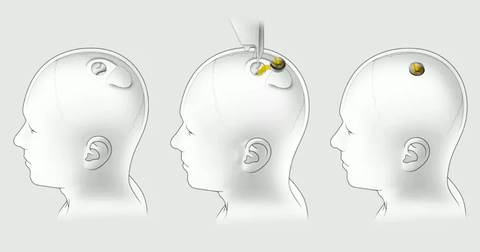Elon Musk Helps Mitigate Creepiness of Neuralink With Pig Demonstration
Updated Aug. 29 2020, 2:52 p.m. ET

Technology grows at an exponential and not incremental rate, because new tech contributes to the building of even newer tech, so we're able to work more efficiently and produce at a way faster pace. A simple example of this is memory expansion, it always doubles (1GB->2GB-4GB, etc.) It's this kind of progress that has futuristic, tech-obsessed individuals dreaming about the day when we'll achieve singularity with computers, and Elon Musk's Neuralink announcement is a huge step in that direction.
Elon Musk caused quite a stir with his live Neuralink demonstration.
The head of Tesla and SpaceX called the new device "a FitBit in your skull," and it rocks technology that is able to successfully link someone's brain activity to a computer.
Neuralink is about the size of a quarter and is packed with electrodes that sends signals to a computer which can read data that's being sent from inside your skull. It's one of the most ambitious large-scale product demos of its nature to date, that of course received widespread coverage due to Musk's celeb status.
The U.S.'s FDA-granted "breakthrough device" testing capabilities according to Musk. Theoretically, if the Neuralink gets greenlit for human use, it'll be "implanted" by cutting a hole in your skull (yikes), with 1,024 thin electrode threads monitoring all of your nervous system's electrical pulses. It currently communicates with computers via Bluetooth, but other radio technology is also being considered in an attempt to multiply the number of simultaneous data lines possible.

Elon Musk demonstrated the Neuralink on pigs.
While the thought of drilling into your head to put an electronic device induces all sorts of squeamish feelings and thoughts of dystopian futures (imagine someone "hacking" your brain and emotionally influencing you to punch someone you love in the face or liking someone you otherwise can't stand), many commented that demonstrating Neuralink's capabilities on a pig helped to "normalize" the product somewhat.
Biologically and genetically speaking, human beings share a lot in common with pigs, in fact, even the way our internal organs are set up are extremely common to our squealing, porky pals.
Gertrude was the pig shown off in Musk's presentation and as it was sniffing around on the stage, the Neuralink was able to read the animal's brain waves, a huge step from Neuralink's testing with reading a rat's brain activity while hooked up to a USB-C connector.
Is Elon Musk the "Anti-Christ" for introducing Neuralink?
People are seriously asking this question and getting freaked out over the announcement, but it's important to note that Neuralink's initial usages will be primarily for medical purposes and could improve the quality of life for a litany of folks dealing with various neurological and brain disorders, including: paraplegics, insomniacs, those who've suffered spinal cord damage, people who've been diagnosed with Parkinson's disease. The possibilities are endless.
Musk gave some real world examples of how Neuralink can help restore range of motion to individuals who've suffered nerve damage: "If you can sense what people want to do with their limbs, you can do a second implant where the spinal injury occurred and create a neural shunt. I'm confident in the long term it'll be possible to restore somebody's full body motion." If this can be accomplished, it'll be one of the most significant medical advancements our species has ever achieved.
Musk also predicts other futuristic uses for Neuralink, like "backing up" our memories and telepathy.
If Neuralink can effectively read people's thoughts, then it's possible for two people with connected Neuralinks to communicate with one another telepathically. Imagine how much more efficient it'd be to communicate with shared thoughts instead of writing or speaking?
Musk hasn't been shy when it comes to sharing his opinion on the future of artificial intelligence either; he believes there's a good chance AI could spell our species' doom.
Neuralink is a tool, Musk believes, to help combat that very possible future, "It's going to be important from an existential threat perspective to achieve a good AI symbiosis."
Yes, this definitely sounds like the kind of practical speech the bad guy in a hopeless-future-film makes to get society on board with his plans for global domination, but, I mean, the ability to save your memories on a hard drive does seem kind of cool.
"The future is going to be weird. In the future you will be able to save and replay memories. You could basically store your memories as a backup and restore the memories. You could potentially download them into a new body or into a robot body," Musk said, theorizing on a scenario where Neuralink could grow into a vehicle for a specific kind of immortality for humans.
Musk acknowledged that the more he delved into Neuralink's possibilities, the more things began "sounding like a Black Mirror episode," but he's hopeful about its many uses, like giving people the ability to see in infrared or giving "somebody super vision."
It's a lot to unpack at once, and the entire press conference has opened up so many different possibilities for the development of humanity as a species and ways to enhance our existing biology, that it's hard not to have your mind blown.
But with our greater reliance on technology, it would make sense to incorporate our own biology in meaningful ways to enhance our lives. Personally, I'm excited at the prospect of inching closer to a technological singularity that includes implants, nanomachines, and immortality.
And even if that doesn't happen, the ability "to help fight memory loss, blindness, paralysis, depression, insomnia, seizures, addiction, brain damage," is pretty damn amazing too.